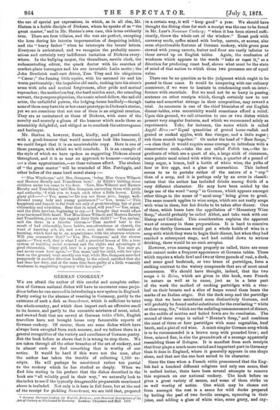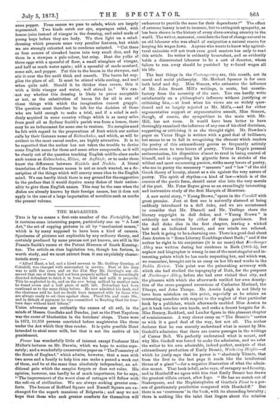GERMAN COOKERY.*
'Wiz are afraid the author of this careful and complete collec- tion of German national dishes will have to encounter some preju- dices before he can succeed in introducing a new system in England. Partly owing to the absence of roasting in Germany, partly to the -existence of such a dish as Sauerkraut, which is sufficient to taint the whole country, and which does impart such an offensive smell to its houses, and partly to the eccentric mixtures of meat, salad, and stewed fruit that are served at German tables d'hôte, English travellers have not brought home very favourable reports of German cookery. Of course, there are some dishes which have .always been excepted from such censure, and we believe there is a _general recognition of the variety and excellence of German pastry. But the book before us shows that it is wrong to stop there. We are taken through all the other branches of the art of cookery, and in almost each we find something that is worthy of our notice. It would be hard if this were not the case, after the author has taken the trouble of collecting 1,160 re- ceipts. He will perhaps be considered rather too partial to the cookery which he has studied so deeply. When we End him stating in his preface that the dishes described in the book are "all reliably good in their way," we naturally look to the index to see if the typically disagreeable preparatidu mentioned above is included. Not only is it here in full force, but at the end cf the receipt for pickling Sauerkraut, we are told that, prepared * German National Cookery for English Kitchens ; with Practical Descriptions of the Art of Cookery as Performed in Germany. London: Chapman and Hall. 1873. in a certain way, it will "keep good" a year. We should have thought the fitting close for such a receipt was the one to be found in Mr. Lear'a Nonsense Cookery; "when it has been stirred suffi- ciently, throw the whole out of the window." Roast pork with carraway seeds, coffee mixed with barley, carrots, or acorns, also seem objectionable features of German cookery, while green peas stewed with young carrots, butter and flour are vastly inferior to those served up on English tables. Again, the confession of weakness which appears in the words "bake or roast it," as a direction for producing roast beef, shows what must be the state of mind of that nation to which those two processes are of equal value.
There can be no question as to the judgment which ought to be passed in these cases. It would be tampering with our culinary conscience, if we were to hesitate in condemning such an inter- ference with essentials. But we need not be as hasty in passing-- sentence on other receipts which, though certainly new to our tastes and somewhat strange in their composition, may reward a trial. As sameness is one of the chief blemishes of our English dinner-tables, even eccentricity would sometimes afford a relief. Upon this ground, we call attention to one or two dishes which present very singular features, and which we recommend solely as experiments. Take, for instance, the sauce which is called Aepfel Kren :—" Equal quantities of grated horse-radish and grated or cooked apples, with fine vinegar, and a little sugar ; rub them smooth together." Or under the head of "Beer Soups," —a class that it would require some courage to introduce with a conservative cook,—take the one called Polish tea,—the in- gredients of which are a quart of ale, a large stick of cinnamon, some potato meal mixed with white wine, a quarter of a pound of lump sugar, a lemon, half a bottle of white wine, the yolks of four or five eggs, and a glass of maraschino. This indeed seems to us to partake rather of the nature of a " cup " than of a soup, and it is perhaps only by an error in classifi- cation that the author has included drinks among fluids of a very different character. He may have been misled by the large use of the word " soup " in German, which appears amongst other things in the name of "meal-soup" being given to gruel. The same remark applies to wine soups, which are not really soups with wine in them, but hot drinks to be taken after dinner. One of them, which bears here the appellation of "Monastery Wine Soup," should probably be called Abbot, and take rank with our Bishop and Cardinal. This consideration explains the apparent want of economy in these preparations. It is hard to conceive that the thrifty Germans would put a whole bottle of wine in a soup with which they were to begin their dinner, but when they had reached a subsequent stage, and had settled down to serious drinking, there would be no such scruples.
However, even among soups properly so called, there are some that cannot make a frequent appearance at German tables. Those which require a whole fowl and two or three pounds of veal, a duck, and some good beefsteak, or two brace of partridges, form a striking contrast to the watery compounds that are of most usual occurrence. We should have thought, indeed, that the two soups a /a Beine, which are given in this book, were French in nature as well as in name, just as in a later part of the work the method of cooking partridges with a vine- leaf on their breasts and a slice of bacon round them bears the marks of an Italian origin. But the duck soup and the partridge soup that we have mentioned seem distinctively German, and will probably be found useful substitutes for the everlasting "white or clear soup, Sir," which are the unfailing commencement of dinner, as the saddle of mutton and boiled fowls are its conclusion. The second of these soups is called "Hunter's Soup," and combines the meat of three or four partridges with some vegetables, beef broth, and a pint of red wine. A much simpler German soup which is to be recommended is a brown soup with pounded liver ; and liver, minced fine, is also the groundwork of a sausage apparently resembling those of Bologna. It is manifest from such receipts that liver plays a much more varied and important part in Germany than it does in England, where it generally appears in one shape alone, and that not the one best suited to its character.
Since the time when a French critic pronounced that the Eng- lish had a hundred different religions and only one sauce, that is melted butter, there have been several attempts to remove this reproach on our national cookery. The book before us gives a great variety of sauces, and some of them strike us as well worthy of notice. One which may be chosen out from amongst the rest is a sauce for wild ducks prepared by boiling the peel of two Seville oranges, squeezing in their juice, and adding a glass of white wine, some gravy, and cay- enne pepper. From sauces we pass to salads, which are largely represented. Two kinds catch our eye, asparagus salad, with lemon-juice instead of vinegar in the dressing, and salad made of young hops before they are leafy. We then light on a salad- -dressing which presents some very peculiar features, but which we are strongly exhorted not to condemn untested. "Cut three or four ounces of streaked bacon into very small dice, and fry them in a stewpan a pale colour, but crisp. Beat the yolks of three eggs with a spoonful of flour, a small wineglass of vinegar, and half as much water again ; add a spoonful of made mustard, some salt, and pepper. Put this to the bacon in the stewpan, and stir it over the fire until thick and smooth. The bacon fat sup- plies the place of oil. It must be stirred while cooling, and used when quite cold. Should it be thicker than cream, thin it with a little vinegar and water, well stirred in." We can- "not say whether this dressing is likely to prove acceptable or not, as the substitution of bacon fat for oil is one of those things with which the imagination cannot grapple. The question must therefore be left for the decision of those who are bold enough to make a trial, and if a salad is sud- denly mquired in some country village which is as many miles from good oil as Sydney Smith's parish was from a lemon, there may be an inducement for some one to venture. No scruples need Le felt with regard to the preparations of fruit which our author calls by their German name of Kalteschalen, and which, as will be evident to the most casual reader, are highly attractive. It is to be regretted that the author has not taken the trouble to devise some English name for these and some other compounds, as it will be clearly out of the question teaching English middle-class cooks such names as Kalteschalen, Masse, or Auflaufe, or to make them know the difference between Knodeln and Nudeln. A literal translation of the German names is not so much wanted, as a de- scription of the things which will convey some idea to the English mind. We can hardly think there is any ground for the suggestion in the preface that it would deprive many dishes of their nation- ality to give them English names. This may be the case when the dishes are already known by their foreign names, but it does not apply in the case of a large importation of novelties such as marks the present volume.



































 Previous page
Previous page